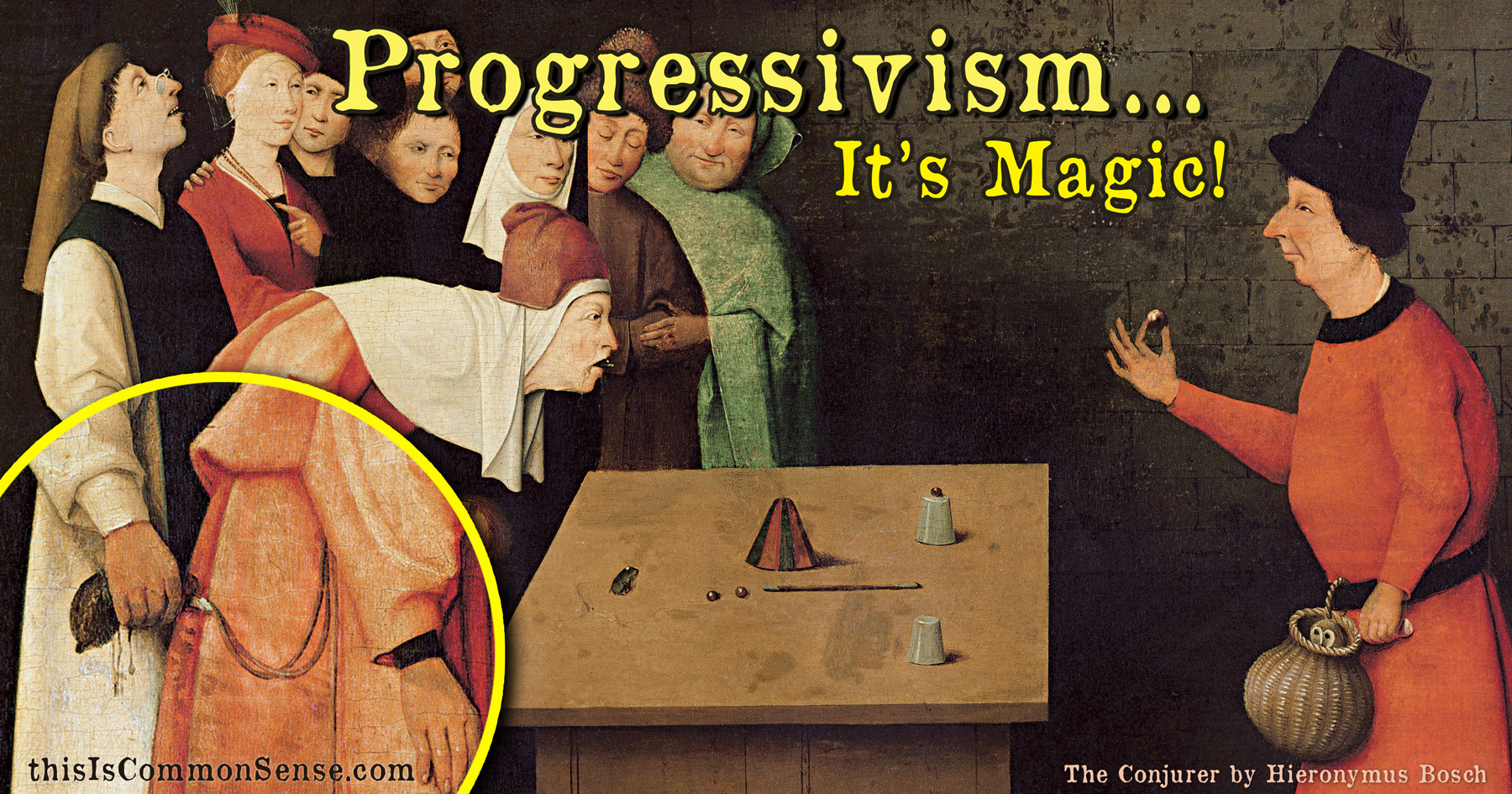Don’t worry comrades!
Click here for a high resolution version of the image (suitable for sharing and using as a screensaver):


In Tuesday night’s debate, Democrats put all their egos in one ideological basket: progressivism. Even Jim Webb managed to sound progressive … until he identified his prime personal enemy — the man he shot in wartime.
Bernie Sanders once again insisted on lecturing Americans on what it means to be a “democratic socialist.” Martin O’Malley relentlessly pursued an impossible dream, 100 percent carbon-free electric production by 2050 — far enough off to avoid any possible accountability. And Hillary Clinton said that, sure, she’s a progressive, “a progressive who likes to get things done!”
But what has she “got done,” ever?
It was her secrecy regarding the initial health care reforms back in her husband’s first term that helped spark the firestorm of opposition that led to the Revolution of ’94, and to the triangulating successes of the master of manipulative compromise, Bill Clinton. His was not a “progressive era,” though Democrats still use the 1990s as proof that their (“our”) policies “work.”
With exception of Bernie on gun control and Hillary on foreign policy and spying (Snowden gave out secrets to the enemy: traitor; she gave out who-knows-what via her insecure email server: blankout), the spend-spend-spend mantra of progressivism, mixed with “fair taxes” (higher tax rates) on the top 1 percent, was not challenged on the stage.
How far would they go to close ranks? Bernie sided with her regarding “your damned e‑mails.” That’s so ideological as to eschew any consideration of character or loyalty or trust.
Quite a revolution … in the party.
This is Common Sense. I’m Paul Jacob.

The headline? Gaspworthy: “World’s First Lesbian Bishop Calls for Church to Remove Crosses, To Install Muslim Prayer Space.”
Are we being punked? Onion-ized?
I checked: apparently not.
The place is the Seamen’s mission church in the eastern docks of Stockholm. The Church of Sweden’s local bishop challenged the mission’s priest with a what-if: Suppose a Muslim came off the boats and wanted a place to pray?
Had the encounter been just a one-off, we could shrug it off. But this is one latitudinarian cleric, and she didn’t let it go:
Calling Muslim guests to the church “angels,” the Bishop later took to her official blog to explain that removing Christian symbols from the church and preparing the building for Muslim prayer doesn’t make a priest any less a defender of the faith. Rather, to do any less would make one “stingy towards people of other faiths.”
Generosity über alles strikes again!
I’ve long wondered about radicals who infiltrate religions. If you don’t like Catholicism, join or start something else; if you find the Baptist Conventions opprobrious, check out the Methodism, Greek Orthodoxy, or … Thelema. Why horn in on someone else’s religion?
But there is a reason it’s happening in the city that gave us “Stockholm Syndrome.” The Church of Sweden’s a state institution, while Scandinavia’s real religion is secular progressivism. You need no gift of prophecy to see where that’s bound to go.
Separation of church and state just makes sense. To each religion its own. There need be no fighting for adherents, or laying down of one’s own beliefs merely to appeal to “inclusion.”
Unless or until you get the government involved.
This is Common Sense. I’m Paul Jacob.

Urban African-American poverty is a problem, as is, increasingly, rural and urban white poverty. What can we do?
Not what folks at The Nation suggest: by increasing progressivity in local taxation, adding progressivity to fines (making the poor pay less and the rich more), and the like. That’s the gist of what Brad Lander and Karl Kumodzi write about in their article “How Cities’ Funding Woes Are Driving Racial and Economic Injustice — And What We Can Do About It.”
Though they call their solution “forward-looking,” it is not that time element that makes their views “progressive.” It’s their obsession with tax rates. What makes a progressive a progressive seems to be little more than a reliance on progressive rate taxation.
Embarrassing.
The three big examples of failed cities the authors give are the urban community of Ferguson, near St. Louis; Detroit, Michigan; and now Baltimore, Maryland, currently undergoing “protests” and conflagration.
Typical for Nation writers, they see the problem as not the poverty, culture, and behavior of black individuals in neighborhoods where few work and 70 percent grow up in fatherless families, but not taxing whites enough.
Meanwhile, Detroit and Baltimore have been run as “liberal” Democratic enclaves for years. Yet “blame the rich” is the approach. The authors want to double down on old, failed policies. More taxes. More government.
Now, government is to blame, of course: “welfare” programs encourage the break-up of the nuclear family; horrible public schools; minimum wage laws that hit low-skilled population hardest; and the Drug War.
The authors are right, though, that the cities’ desperate regressive burdens on the poor are no answer. Less taxes, less regulation, less subsidy, less policing for profit, more freedom — those are the better solutions.
This is Common Sense. I’m Paul Jacob.
If conservative Eris-wannabe and apple-thrower Ann Coulter wants to understand why those of us working for truly limited government sometimes have trouble voting GOP down the line, she might consider her beloved party’s history.
The Republican Party started out as the Big Government party, combining the abolitionist/anti-slavery cause with the “internal improvement” Whig Party remnant. That is, the party started out half right, half big government.
Further, Republican Teddy Roosevelt introduced Progressivism into national politics in a big way.
No wonder the Grand Old Party has been so bad about limiting government. It was the party that unleashed unlimited government in the first place. Institutional inertia set in. Some Republicans remain progressives at heart — though nowadays, thankfully, a tad more cautious in their progressivism.
George W. Bush’s many big-gov measures were no abberation.
Heedless of this history, Coulter called limited government folks who vote the Libertarian ticket “idiots,” ending her latest column with a dare: “If you are considering voting for the Libertarian candidate in any Senate election, please send me your name and address so I can track you down and drown you.”
Over at Reason, Ron Bailey provided Google instructions for Ann to get to his house. He’s voting for Robert Sarvis, the Libertarian candidate in Virginia.
I have trouble calling science writer Bailey an idiot for his vote preference. Sarvis is a lot better than his incumbent Republican competitor, Ed Gillespie — whom Sarvis aptly dubbed a “blank check for George W. Bush.”
Maybe Coulter should threaten to “drown” Big Gov GOPers for a change.
Or stop the death threats altogether and help find better Republican candidates.
This is Common Sense. I’m Paul Jacob.
Want to understand a political movement? Distinguish between its early proponents and its later followers. The thinking and rhetoric change over time.
Take Progressivism. It started out as an intellectual movement. Its leading lights were Americans who had studied in foreign colleges and universities. They brought back European ideas of an aggrandized state to counteract American notions of limited government.
Though I disagree with their notions almost totally (with interesting exceptions), it’s worth noting that they thought they were “scientific,” and would sometimes even encourage an experimental attitude towards public policy: Devise new programs, test them, chuck them when they don’t work.
Modern “progressives” don’t seem to sport that “testing” idea any longer.
I just received an email from BarackObama.com, which was complaining about the Speaker of the House, who — on TV, of all things! — said that “Congress ‘should not be judged on how many new laws we create,’ but rather on ‘how many laws … we repeal.’” My BO correspondent found this “embarrassing”:
We elected our members of Congress to work on the issues we care about: creating jobs, fixing our immigration system, fighting climate change, and passing laws to reduce gun violence.
We didn’t put them in office to sit there and wind back the clock.
Notice the assumption here: All the laws on the books are good, serving the common good; none are worthy of repeal.
Doesn’t seem like an assumption an early Progressive thinker would have made. But for too many of today’s progressives, progress apparently consists in accumulating regulations, rules, prohibitions, and tax programs as if each one were a pearl of great price.
Progress is government growth? That defies common sense.
This is Common Sense. I’m Paul Jacob.